
Navigating rejection and criticism is an inevitable part of any artist’s journey. Even the most successful musicians, from Billie Eilish to Kendrick Lamar, have faced setbacks, rejections, and negative feedback. The key isn’t to avoid these challenges, but to learn how to handle them in a way that keeps you moving forward and staying true to your artistic vision. Here’s a guide to help you manage rejection and turn negative feedback into fuel for growth.
1. Rejection is Part of the Journey
No matter where you are in your career, rejection will pop up in one form or another. Whether it’s a label that isn’t interested, a venue that doesn’t think you’re the right fit, or a fan who leaves a stinging comment, rejection is part of the process. But it’s not a reflection of your worth or talent.
Think of the legends who faced setbacks early on. The Beatles were famously turned down by record labels, but that didn’t stop them from becoming one of the most influential bands in history. Rejection often says more about the gatekeepers than about your art. Instead of letting it define you, consider it a stepping stone in the journey.
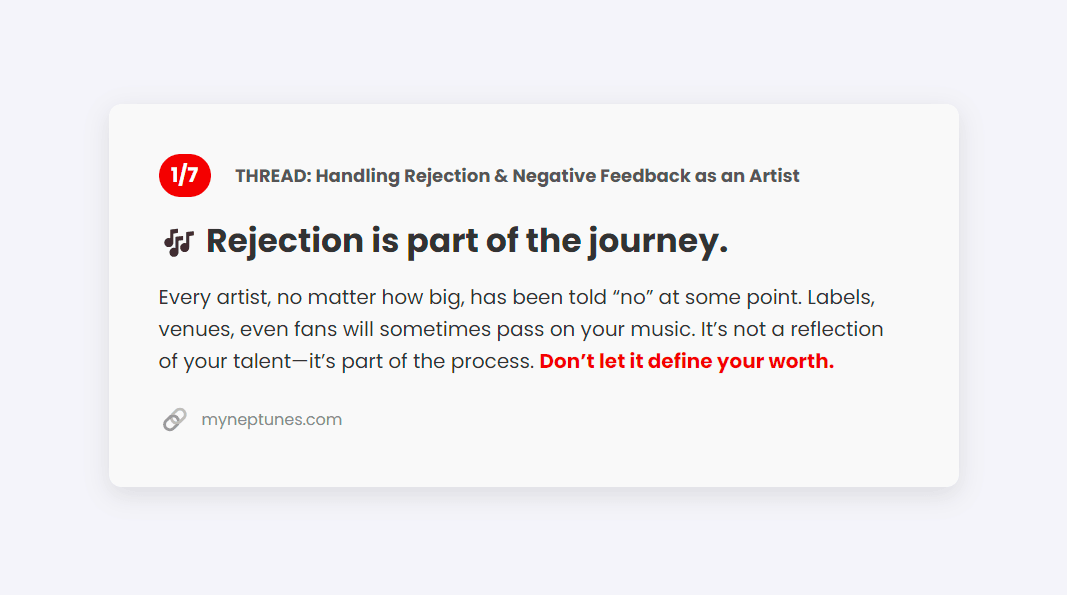
Action Step: Use each rejection as a reminder of what you’re working toward. Write down every “no” as a badge of honor and motivation to keep going.
2. Separate Yourself from Your Art
It’s easy to take criticism personally – your music is an extension of yourself, and negative feedback can feel like a personal attack. However, learning to create a bit of distance between you and your art can help you handle critiques more effectively. Not every opinion is about you as a person; often, it’s simply feedback on the work itself.
For instance, Lady Gaga has spoken openly about the challenges of handling criticism. By learning to detach herself from public opinion, she stays grounded in her artistry. This separation can be healthy, allowing you to accept constructive feedback without letting it bruise your self-esteem.
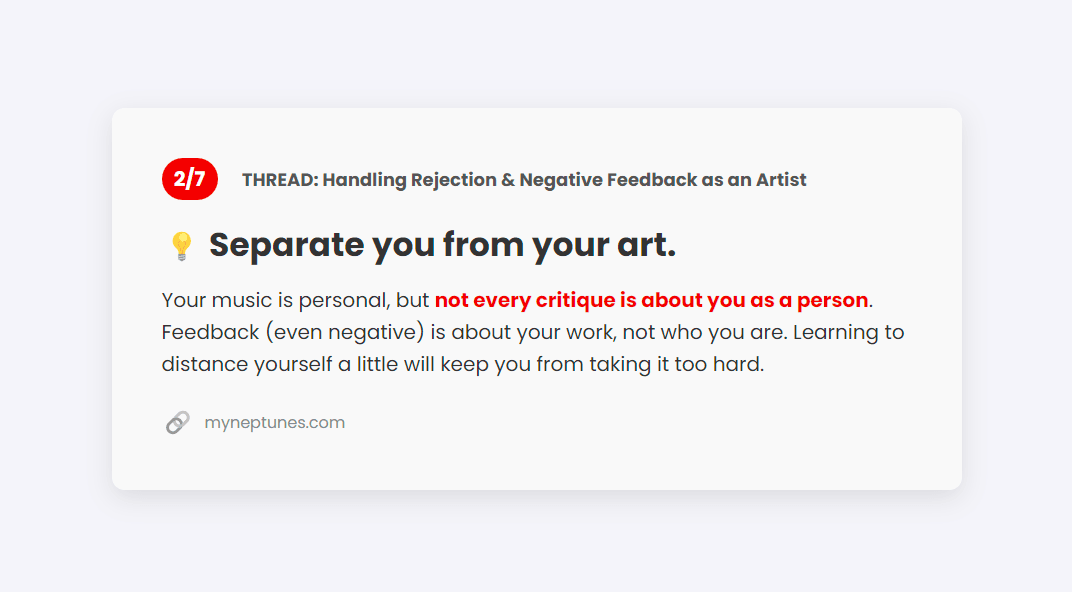
Action Step: Practice viewing your music as a product of your creativity, but not a definition of you. This shift can make handling feedback feel less like a personal blow and more like part of your artistic growth.
3. Not All Feedback Is Valid
One of the most liberating realizations as an artist is that not every opinion matters. Social media can make it seem like everyone’s voice is equal, but that’s not the case when it comes to your art. Some feedback is constructive, while some is just noise. Knowing which critiques are worth your time is a valuable skill.
When evaluating feedback, ask yourself:
- Does this person understand my genre or style?
- Are they offering feedback that could help me improve?
- Does their opinion align with my vision for my art?
If the answers lean toward “no,” it’s safe to let the feedback slide. Remember, online trolls and non-supportive voices often have little context for your work and aren’t adding any value.
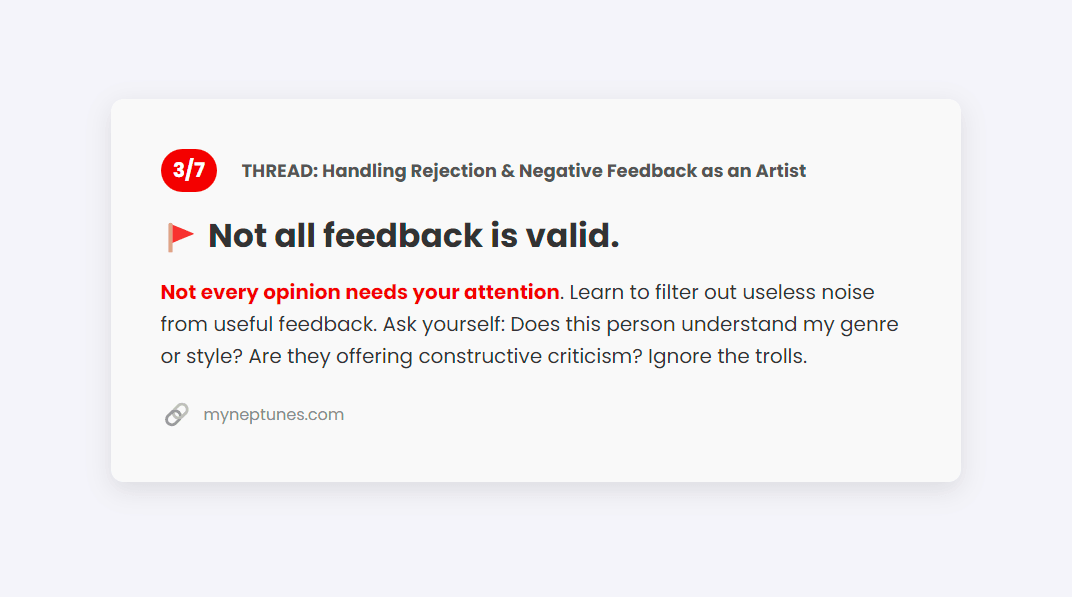
Action Step: Filter feedback by relevance and credibility. Focus on constructive critiques from people who appreciate your genre and know the music industry.
4. Use Criticism to Improve
Negative feedback can sting, but it’s also one of the best tools for growth. Constructive criticism often points out areas for improvement that you may not have noticed on your own. By approaching feedback with an open mind, you can use it to elevate your work and become a more refined artist.
Many top musicians have spoken about the value of critique. Ed Sheeran, for example, has mentioned how he honed his skills over time by taking constructive criticism seriously. If someone highlights a weak point in your performance, lyrics, or production, consider it an opportunity to get better.
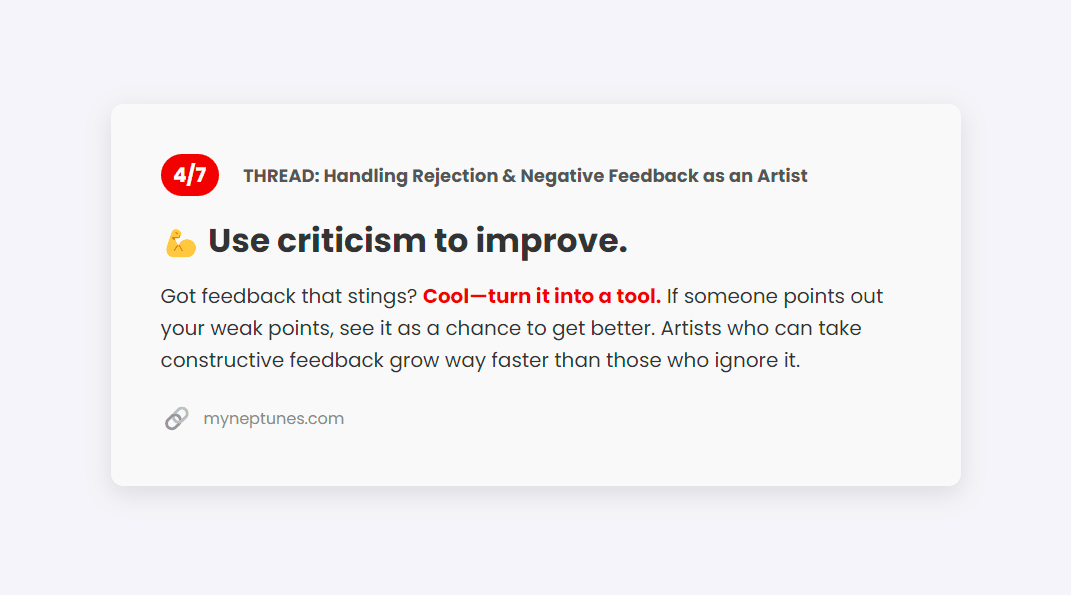
Action Step: Keep a journal of constructive feedback you receive. Use it as a checklist for areas to work on, and track how your music evolves as a result.
5. Don’t Chase Approval
Trying to please everyone is a recipe for artistic compromise. Staying true to your vision might mean not everyone will “get” your music – and that’s okay. The world doesn’t need more people-pleasers; it needs unique voices that stand out.
Consider Tyler, The Creator, who has built a career on doing things his way, even if it means polarizing audiences. His authenticity has attracted fans who genuinely appreciate his work. Rejection can actually help refine your audience, pushing you closer to the fans who truly resonate with your sound.
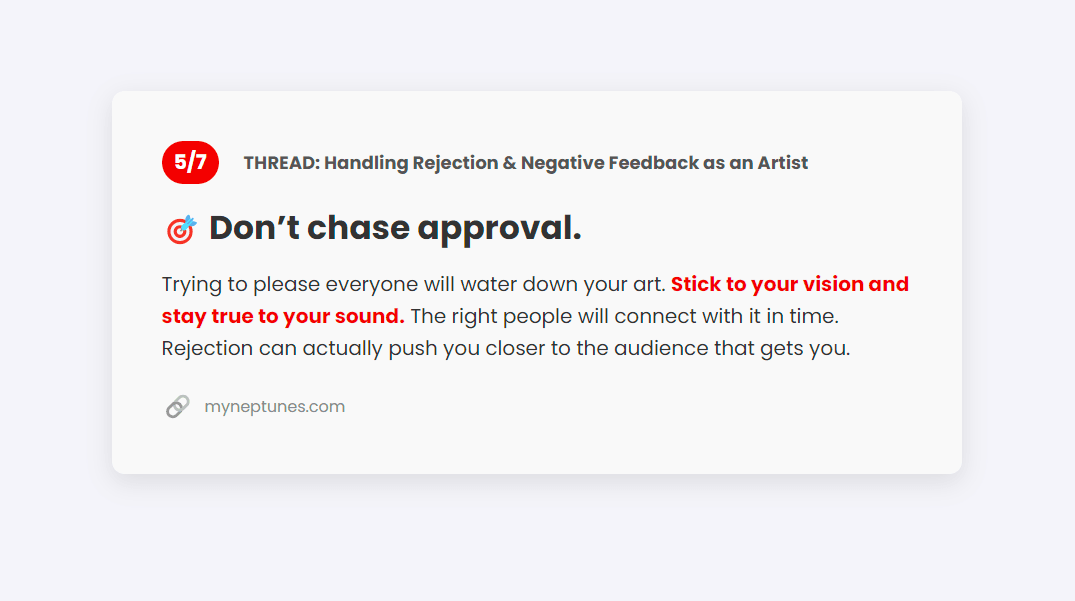
Action Step: Define your artistic vision clearly. Every time you receive criticism, ask yourself: does this align with my vision? If it doesn’t, let it go. Your core audience will appreciate your authenticity.
6. Build a Support System
One of the best defenses against the sting of rejection is a strong support network. Surround yourself with friends, family, and mentors who believe in you and your music. Trusted allies can offer honest feedback, help you process negative experiences, and remind you of your strengths.
Beyoncé, for instance, relies on her family and trusted team for support, which helps her stay grounded. This support system serves as a buffer against harsh criticism and ensures she has people in her corner when things get tough.
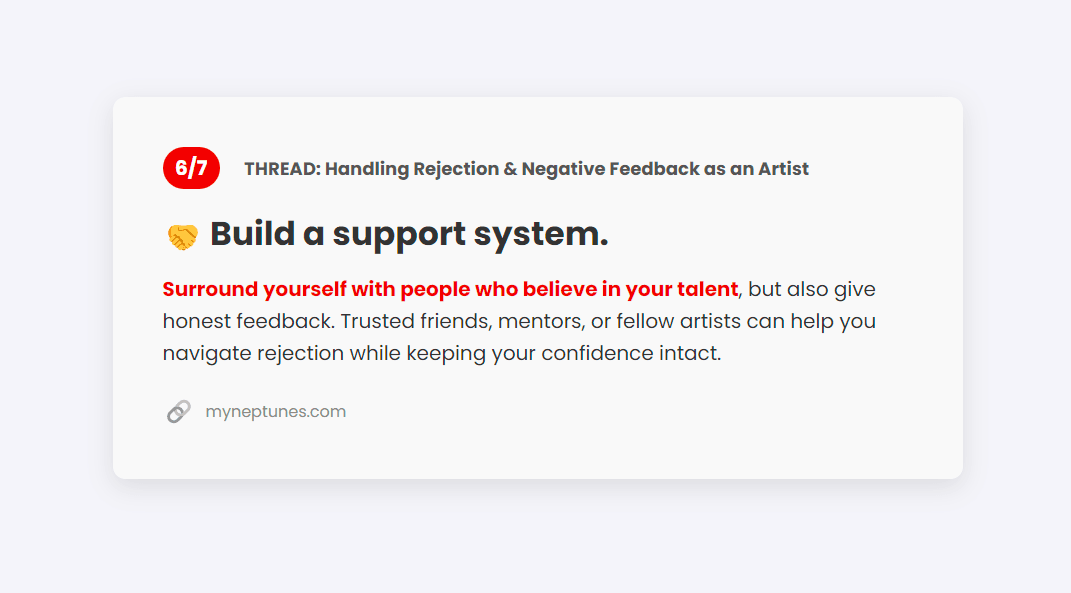
Action Step: Create a network of supportive people—other artists, mentors, or close friends—who can offer balanced, honest feedback and encouragement.
7. Keep Moving Forward
Rejection can feel like a roadblock, but it doesn’t have to stop your momentum. The most important thing you can do is to keep creating, learning, and growing. Every “no” brings you closer to the right “yes.” Successful artists keep going, refining their skills and putting out work consistently despite setbacks.
Jay-Z was famously rejected by record labels early in his career, which led him to create his own label, Roc-A-Fella Records. This determination not only launched his career but paved the way for him to become one of the most successful rappers in history.
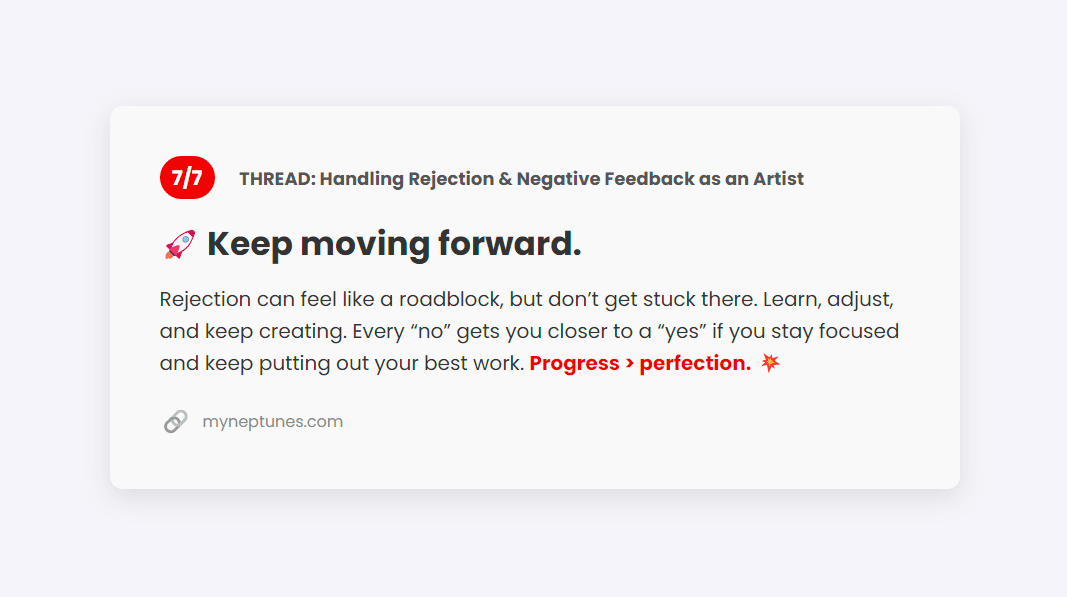
Action Step: Whenever you feel discouraged by rejection, make a list of small actions you can take to move forward. Write a new song, connect with fans online, or brainstorm ways to market your music. Keep making progress, even if it’s one step at a time.
Final Thoughts
Rejection and criticism are unavoidable, but with the right mindset, they can become powerful tools for growth. Staying focused on your unique vision, surrounding yourself with a supportive network, and using feedback constructively will help you rise above setbacks. Every artist’s journey has its bumps; what defines you is how you handle them. Keep pushing forward, stay true to your craft, and remember – every “no” brings you one step closer to the right “yes.”
Fuel our passion for supporting emerging artists

Donations are voluntary and do not entitle donors to additional features, services, or benefits. Your support keeps our non-profit alive and thriving. More info
Bonus:
FAQ
Separate your art from yourself by viewing it as a product of your creativity rather than a definition of who you are. Practicing this mindset can help you stay open to feedback without letting it affect your self-worth.
While it’s good to adapt, avoid compromising your vision just to please others. Sticking to your authentic sound will help you attract a fanbase that truly connects with your music.
Consider the source. Constructive feedback often comes from people who understand your genre or have knowledge of the music industry. Random criticism on social media may not be relevant to your growth.
Take time to process your emotions, then reflect on what you learned from the experience. Use it to fuel your next steps, whether that’s practicing, creating new material, or seeking other opportunities.

